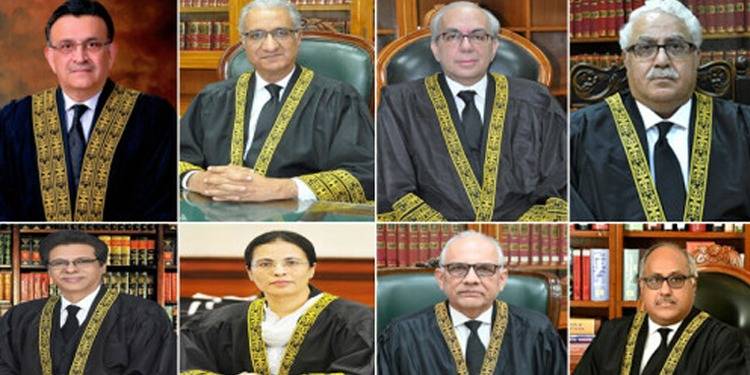
The Supreme Court on Thursday suspended a parliamentary bill seeking to clip the suo motu powers of the Chief Justice, till a final verdict is issued in this regard.
The bench, led by Chief Justice of Pakistan Bandial, and comprising Justices Ijaz-ul-Ahsan, Munib Akhtar, Sayyed Mazahar Ali Akbar Naqvi, Muhammad Ali Mazhar, Ayesha Malik, Syed Hasan Azhar Rizvi, and Shahid Waheed took up the Supreme Court (Practice and Procedure) Bill, 2023.
"Prima facie the contentions raised disclose that there is a substantial, immediate and direct interference with the independence of the judiciary in the form of multiple intrusions, in the guise of regulating
the practice and procedure of this Court and conferring upon it a jurisdiction that appears not to be permissible under any constitutional provision," the order read.
The apex court added, "Such intermeddling in the functioning of the Court, even on the most tentative assessment, will commence as soon as the Bill becomes the Act. Accordingly, in our view an interim measure ought to be put in place, in the nature of an anticipatory injunction."
The making of such an injunction, to prevent imminent apprehended danger that is irreparable, is an appropriate remedy, recognised in our jurisprudence and other jurisdictions that follow the same legal principles and laws, the order maintained.
The moment that the Bill receives the assent of the President or (as the case may be) it is deemed that such assent has been given, then from that very moment onwards and till further orders, the Act that comes into being shall not have, take or be given any effect nor be acted upon in any manner.
During the hearing, the top judge remarked that the court has the utmost respect for the parliament and issued notices to President Dr Arif Alvi, Prime Minister Shehbaz Sharif, and others and adjourned the hearing till next week.
The Pakistan Bar Council (PBC) boycotted court proceedings and the ruling coalition rejected the bench and termed it ‘controversial’.
None of the judges who questioned the CJP's authority have been included on the bench.
In a joint statement released before the hearing, the ruling coalition parties criticized the decision to form a bench before the legislative process was completed, calling it an attack on parliament.
Prior to this, the office bearers of the Pakistan Bar Council (PBC), Haroonur Rashid and Hassan Raza Pasha, said that CJP Bandial hastily formulated the bench to hear the petitions.
They said that on Thursday, the lawyers would boycott court hearings all around the country.
After being returned by President Dr. Arif Alvi, the bill limiting the CJP's authority was approved by a joint session of parliament earlier this week.
Raja Amer Khan, Chaudhry Ghulam Hussain, and Mohammad Shafay Munir, among others, then filed three separate petitions under Article 184(3) of the Constitution requesting the supreme court strike down the measure.
After President Arif Alvi returned the bill last week without signing it, the federal administration managed to have it passed in a joint session of parliament on Monday.
SC order
The bench, led by Chief Justice of Pakistan Bandial, and comprising Justices Ijaz-ul-Ahsan, Munib Akhtar, Sayyed Mazahar Ali Akbar Naqvi, Muhammad Ali Mazhar, Ayesha Malik, Syed Hasan Azhar Rizvi, and Shahid Waheed took up the Supreme Court (Practice and Procedure) Bill, 2023.
"Prima facie the contentions raised disclose that there is a substantial, immediate and direct interference with the independence of the judiciary in the form of multiple intrusions, in the guise of regulating
the practice and procedure of this Court and conferring upon it a jurisdiction that appears not to be permissible under any constitutional provision," the order read.
The apex court added, "Such intermeddling in the functioning of the Court, even on the most tentative assessment, will commence as soon as the Bill becomes the Act. Accordingly, in our view an interim measure ought to be put in place, in the nature of an anticipatory injunction."
The making of such an injunction, to prevent imminent apprehended danger that is irreparable, is an appropriate remedy, recognised in our jurisprudence and other jurisdictions that follow the same legal principles and laws, the order maintained.
The moment that the Bill receives the assent of the President or (as the case may be) it is deemed that such assent has been given, then from that very moment onwards and till further orders, the Act that comes into being shall not have, take or be given any effect nor be acted upon in any manner.
During the hearing, the top judge remarked that the court has the utmost respect for the parliament and issued notices to President Dr Arif Alvi, Prime Minister Shehbaz Sharif, and others and adjourned the hearing till next week.
The Pakistan Bar Council (PBC) boycotted court proceedings and the ruling coalition rejected the bench and termed it ‘controversial’.
None of the judges who questioned the CJP's authority have been included on the bench.
In a joint statement released before the hearing, the ruling coalition parties criticized the decision to form a bench before the legislative process was completed, calling it an attack on parliament.
Prior to this, the office bearers of the Pakistan Bar Council (PBC), Haroonur Rashid and Hassan Raza Pasha, said that CJP Bandial hastily formulated the bench to hear the petitions.
They said that on Thursday, the lawyers would boycott court hearings all around the country.
After being returned by President Dr. Arif Alvi, the bill limiting the CJP's authority was approved by a joint session of parliament earlier this week.
Raja Amer Khan, Chaudhry Ghulam Hussain, and Mohammad Shafay Munir, among others, then filed three separate petitions under Article 184(3) of the Constitution requesting the supreme court strike down the measure.
After President Arif Alvi returned the bill last week without signing it, the federal administration managed to have it passed in a joint session of parliament on Monday.
SC order

